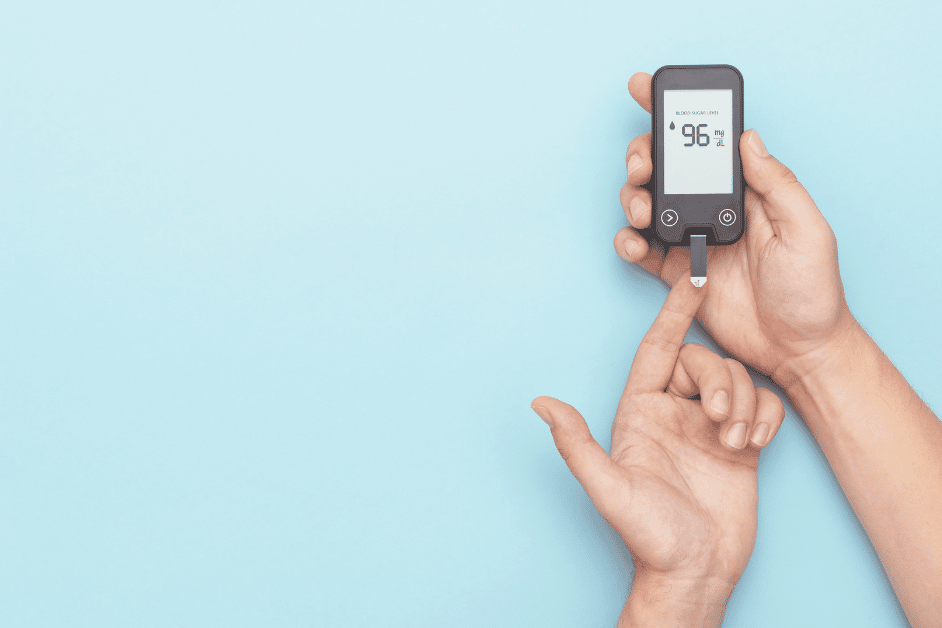Your brain is foggy. Making even small decisions feels overwhelming.
You’re worried about everything and it’s hard to sleep at night.
The fatigue that nearly overpowers you makes you want to go back to bed and pull the covers over your head and hide from everyone and everything.
You’re cranky, restless, and on edge. Panic attacks cause your heart to race and your palms to get sweaty.
Even if you only have only a couple of these problems, you may have generalized anxiety disorder. That’s the bad news.
The good news? You can feel at peace, happy, and calm again. The answer lies in balancing your hormones. But that’s not all. You’ll also need to get rid of problems like blood sugar imbalance that cause your hormones to get out of whack. Then there’s histamine intolerance, which is strongly linked to hormonal imbalances and anxiety.
Hormone Imbalance: The Victim Not the Villain
Imbalanced hormones are not the villains responsible for your anxiety disorder. They’re more like the victims of other problems happening in your body. That’s why as a functional medicine provider specializing in irritable bowel syndrome, inflammatory bowel disease, and women’s fertility issues I see a lot of patients who also suffer from anxiety and panic attacks.
In fact, 75% of my patients present to my clinic with anxiety along with other issues like acid reflux, irritable bowel syndrome (IBS), inflammatory bowel disease (IBD), digestive issues, endometriosis and many more.
Hormones are actually responders, the language the body uses to talk to itself. Hormones express what they’re seeing in the different tissues around your body and tell your body how best to respond.
In other words, when hormones break, it’s not typically the root cause of your problems. Rather, the hormones shift in response to the root cause or causes of your health problems.
That said, working to adjust and balance hormones can help you feel better. When your hormones are balanced, you will have more energy and bandwidth to work on the real root cause underlying your health problems.
In this article, I’m going to dive into one common factor that breaks hormonal balance. Then I’ll hone in on one of the most important hormones for people suffering from anxiety disorder and its link to histamine intolerance.
I’ll also shed light on some of the other reasons for anxiety and panic attacks and let you know what you can do to feel less anxious and more at peace.
First, though, let’s talk about what generalized anxiety disorder actually is and its symptoms.
What Is Generalized Anxiety Disorder?
Everyone gets anxious from time to time. Work deadlines, tests at school, dealing with relationship problems or other stressors can all lead to occasional anxiety.
People with generalized anxiety disorder, on the other hand, experience ongoing worry or fear much of the time.
Often, people with anxiety disorder feel anxious or get panic attacks even while trying to make simple decisions. Generalized anxiety disorder can cause problems at work, in school, and in your relationships.
Symptoms of generalized anxiety disorder include :
- Difficulty concentrating or brain fog
- Fatigue
- Insomnia (difficulty falling or staying asleep)
- Irritability
- Restlessness
- Worry
Generalized anxiety disorder and panic disorder are some of the most common mental disorders in the United States. These are different types of anxiety disorders. Technically, conventional medicine considers panic attacks to be a separate disorder. However, in my experience as a functional medicine provider, most people aren’t going to have panic attacks without already having generalized anxiety disorder.
Symptoms of panic attacks include:
- Feeling out of control
- Feelings of impending doom
- Pounding heartbeat or rapid heart rate
- Shortness of breath, smothering, or choking
- Sweating
- Trembling
Past trauma can trigger panic attacks. But they can also happen in people who have never experienced any trauma.
Blood Sugar Imbalances Wreak Havoc on Hormones
One of the most common reasons why hormones break is because your blood sugar isn’t balanced. I have seen many patients get 90% better just by balancing their blood sugar.
Low blood sugar mimics anxiety. When your blood sugar crashes, the body attempts to push up blood glucose levels. It does this by making epinephrine, otherwise known as adrenaline, which triggers glucose production in the liver.
Increased adrenaline leads to a “fight-or-flight” stress response in the body. This same biochemical process is also linked to anxiety.
If you tumble into a chronic, on-going low blood sugar state, your body may boost its production of the stress hormone cortisol. This helps tissues in the body be less reactive to insulin, which boosts glucose circulation in the bloodstream. But high levels of cortisol can cause problems, too.
Guess what higher cortisol levels are also linked to? Anxiety.
What’s more, in my work with thousands of patients, blood sugar swings have been the biggest driver of fatigue, anxiety, and mood swings!
A functional medicine provider can order the right tests for blood glucose and insulin sensitivity. These include LDH (lactate dehydrogenase), HbA1c (hemoglobin A1c), SHBG (sex hormone binding globulin), fasting glucose, fasting insulin, and sometimes glucose response testing.
To resolve low blood sugar problems that show up on the tests, eat more healthy fats, which are easier to assimilate and digest.
High quality protein is also important. Back before I knew I had polycystic ovary syndrome – a condition linked to insulin resistance – I was eating vegan and vegetarian and chowing down on carbs. This was the wrong approach because anytime you have a problem with blood sugar or insulin, carbs are the bad guys.
The Soothing Effects of Progesterone
Your brain has receptors for sex hormones like progesterone. So it’s not surprising that progesterone can influence brain function and mood.
If you have anxiety, progesterone is one of your best friends.
Women with low progesterone levels are prone to anxiety. That’s why in conditions of low progesterone such as during PMS, post-childbirth, perimenopause, and menopause there’s an increase in anxiety and frequency of panic attacks.
Progesterone and its metabolite allopregnanolone act as a natural antidepressant, enhance mood, and relieve anxiety. Progesterone has a calming effect on the brain. It increases the actions of a feel-good, calming neurotransmitter known as GABA (gamma-aminobutyric acid).
By giving GABA a helping hand, progesterone acts like a hormonal lullaby, helping you fall asleep easier and stay asleep longer.
What’s Histamine Intolerance Got to Do With It?
Histamine is a chemical released by some cells of the body. If you’ve ever had an allergic reaction or seasonal allergies, you’re likely familiar with its effects such as runny rose, sneezing, or hives.
Histamine isn’t always the bad guy. We need some histamine to release stomach acid and to help move food through the gut. The important thing is for histamine to complete its life cycle by being broken down and cleared from the body.
When that doesn’t happen histamine intolerance occurs. This is when the body makes too much histamine and too little of the diamine oxidase (DAO) enzyme needed to break it down.
Anxiety is a symptom of histamine intolerance. Other symptoms include headaches, fatigue, nausea, irregular menstrual cycles, sinus issues, digestive problems, tissue swelling, and dizziness.
In my experience, people most likely to suffer from histamine intolerance are people who are perfectionists. These are often the same people who suffer from anxiety and panic attacks. They want things to be a certain way and hold high expectations.
Characteristics of people most likely to develop histamine intolerance include:
- Academic overachievers
- Highly motivated
- Inner anxiety with a calm exterior
- Being competitive – with themselves and/or others
- Having obsessive/compulsive or ritualistic behaviors, or a need for structure and strong routine, feeling of order and control over things.
The above characteristics can actually be positive and work in your favor. If you have those characteristics you’re highly intelligent, super productive, and probably are successful in work and life. When your hormones are in balance these traits can work for you.
However, if your histamine is too high and your hormones are out of balance then you might develop poor stress tolerance, feelings of anxiety, and insomnia.
Progesterone Guards Against Histamine Intolerance
Progesterone enhances DAO, the enzyme that breaks down histamine. So progesterone helps histamine meet its maker and clear it from the body.
Estrogen dominance, on the other hand, boosts the body’s production of histamine. Women whose histamine production is estrogen driven will see flares of their problems either right before ovulation or more likely right before their period, because that’s when they’re naturally estrogen dominant.
Does anything else cause histamine intolerance besides estrogen dominance? You bet. Genetics can play a role. My own histamine intolerance was partly caused by genetics. But the gut plays a huge role, too. For me, my high histamine and hormonal imbalance came down to the “bad” organisms in my digestive tract (Helicobacter pylori, Giardia, and Candida albicans)
Leaky gut leads to lower levels of DAO and in turn high histamine. This is because the place where your body makes DAO is mostly mucosal barriers like the intestines.
If your liver isn’t working its best, that will cause problems, too. The liver detoxifies histamine. If its detox abilities are weakened, histamine will build up in the body. It’s just one more thing to fill your bucket up to the point of overflowing.
Other Hormones to Watch in Anxiety and Panic
In my patients with anxiety, I always keep an eye on other hormones besides progesterone. These include:
- Thyroid – If thyroid hormone levels are up and down like in Hashimoto’s it can mimic bipolar disorder. Low thyroid hormones are also linked to low progesterone.
- DHEA (Dehydroepiandrosterone) – DHEA is the most abundant circulating hormone. Balancing levels of DHEA can lead to better mood and less anxiety.
- Serotonin/Estrogen – Serotonin makes you feel content, happy, calm, and ready for sleep. It reduces anxiety and the tendency to think about sad or dark thoughts over and over (cyclical thinking or ruminating). You need estrogen to convert amino acids into serotonin.
- Cortisol – Cortisol is primarily produced by the adrenal glands. Adrenal fatigue can make you less likely to cope with stress. If you have a poor stress response, cortisol can be too high or too low. If cortisol goes up due to stress, your progesterone levels can take a tumble.
Strategies to Reduce Anxiety and Panic Attacks
Here are some simple changes you can make to feel calmer and less anxious:
- Reset your inner clock. First thing in the morning, immerse yourself in bright outdoor sunlight without wearing sunglasses. After sundown, expose yourself to dim light. If you’re not doing these things, neither dietary supplements nor hormone replacement therapy will work.
- Let go of toxic people, habits, and behaviors
- Seek professional therapy
- Practice stress management techniques like transcendental meditation, hypnotherapy, somatic therapy, nature immersion, the Gupta Program, and psychedelic journeying.
Natural Hormone Replacement and Dietary Supplements for Stress
Natural Progesterone – Please email office to discuss
A functional medicine provider can prescribe personalized, low-dose bioidentical progesterone. This can relieve symptoms of histamine intolerance and estrogen dominance.
Vitamin B6 supplements can help with histamine balance including PMS related to histamine. Vitamin B6 can:
- Help produce progesterone.
- Promote GABA synthesis.
- Convert L-tyrosine and 5-hydroxytryptophan (5-HTP) to dopamine and serotonin, respectively.
- Enhance DAO production and lower histamine.
Start with 50 mg of vitamin B6 in the form of P5P. You can take more under the guidance of a functional medicine provider.
Magnesium is a natural stress reliever. I prefer the chelated form of glycinate and the product Neuro-Mag.
L-theanine, a substance found naturally in green tea, produces calming brain waves. Passionflower (Passiflora incarnata) also has soothing effects.
Taurine is an amino acid that promotes formation and release of GABA, which quiets down excitatory signals in the brain. A typical dose is 250 mg – 1,000 mg/day.
Best for acute panic attacks rather than chronic anxiety, glycine is an amino acid that interferes with the release of the neurotransmitter norepinephrine. At the first sign of a panic attack, place two grams of glycine powder under the tongue and let it slowly dissolve. This process can be repeated every few minutes if necessary and, in most cases, the problem will resolve within 10 to 15 minutes.
Cannabidiol (CBD)
This phytocannabinoid has calming, soothing effects. In human studies, CBD reduced anxiety caused by a public speaking test in subjects with social anxiety disorder.
This lavender-derived substance (also known as Silexan™) promotes relaxation and calms nervousness.
I Can Help Balance Hormones and Relieve Anxiety
To find out whether the root cause of your anxiety disorder and panic attacks is blood sugar issues, low progesterone, or problems with other hormones, you’re going to need an experienced functional medicine practitioner. The first step is to book a free 15-minute troubleshooting call with me.
If after the call you come on board as a patient, I’ll order the best tests for you and develop a treatment plan based on your unique biochemistry. You will find out the steps you need to take to feel calmer and happier. I know anxiety isn’t easy but together we’ll find a solution to make your life easier.
At the Reverse-Age Method, we believe in a holistic approach to perimenopause and beyond, that addresses the root causes of your symptoms (like insomnia, hot flashes, night sweats, erratic periods, fatigue, skin aging, weight gain, and brain fog)– to also slow the pace that your cells are aging. Whether it’s improving gut health, optimizing detox function, enhancing mitochondrial function, or building muscle mass, our comprehensive program has got you covered.
If you’re new here, be sure to check out our Blog Page for more insights and tips on how to thrive during perimenopause. Our blog is packed with practical advice, success stories, and the latest research to help you on your journey.
For more updates and community support, follow us on social media:
You May Also Like...
A Functional Medicine Practitioner-Designed Postpartum Recovery Plan (For Mom & Baby)
It’s hard to believe my baby girl is coming up on 5 months old already! All the mamas out there know… the postpartum…
Eating for Balanced Blood Sugar
Every year, various diet theories make their way into popular view on the internet. “Everyone should eat less fat”….…
Whether you’re looking for help with your gut, your hormones, or both, our team of practitioners work together to treat the WHOLE you – guiding you to a healthier mind, body, and spirit day by day.



